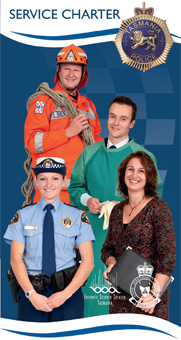>> Download: DPFEM Service Charter brochure (.pdf 2.63MB)
 The Department of Police, Fire and Emergency Management (DPFEM) takes pride in the crime prevention, community policing and emergency management services we deliver.
The Department of Police, Fire and Emergency Management (DPFEM) takes pride in the crime prevention, community policing and emergency management services we deliver.
These services bring us into contact with a diverse range of individuals and organisations, including victims, complainants, offenders and other customers and clients.
This Service Charter outlines our service standards and our commitment to serving the community and explains what people and organisations can expect when interacting with DPFEM or any of our members. It is based on the principle of mutual respect and cooperation – in other words, the more you can assist us, the more we can be of service to you.
This charter underpins, and is fundamental to, every aspect of our service delivery.
- SENSITIVITY
Striving to deal with matters in a professional manner displaying sensitivity and understanding. - EXCELLENCE
Achieving excellence in our dealings with those we serve. - RESPONSE
Ensuring we respond in a timely and appropriate manner. - VALUES
Acting fairly and objectively, accepting responsibility for our actions and seeking to continuously improve. - INTEGRITY
Placing honesty, integrity and professionalism above all else. - COMMITMENT
Committing ourselves to consistently serving the community. - EFFECTIVE
Providing an effective service.
Why have a Service Charter?
We are committed to continually improving our performance by achieving excellence in our dealings with those we serve.
You are entitled to be treated with professionalism and fairness, and to be provided with the appropriate service or information you require. You also have the right to have your complaints addressed with sensitivity in a courteous and efficient manner.
At the same time, our members are entitled to be treated with respect and to be provided with the information they require to be of service to you.
DPFEM values sincere and courteous cooperation between our members and the community.
What are our service standards?
We will:
- respond in a timely and appropriate manner
- communicate professionally and in plain language which is easily understood, including providing language services as required
- advise you of waiting/response times for service or assistance
- advise you of what we are doing and why we are doing it
- treat all of your enquiries with fairness, integrity, privacy and confidentiality
- refer you to another agency or organisation when appropriate.
How do we prioritise calls for assistance?
If you call us for assistance, the priority given to your request will be assessed according to urgency and seriousness. The following categories are used by us to make that determination:
- Priority 1 – Urgent response
Person seriously injured, in danger or trapped; offenders present and/or violence involved. - Priority 2 – As soon as possible response
Person injured, not serious, not in danger; offenders present, recently left, or held but not violent. - Priority 3 – Response when police unit is available
Police attendance is required sometime, but not immediately.
What can you do to help us?
You can help us by:
- providing us with accurate information
- contacting us if the subject of your query or incident changes
- contacting us if you have or need any further information
- being open and honest in your dealings with us
- treating our staff with courtesy and respect
- providing us with feedback about our service.
How is feedback provided?
Feedback on our services is encouraged and provides valuable information from which we can continually improve our services.
We are pleased to hear about positive experiences with our services or members, and we always bring it to the notice of the members concerned.
However, if you are dissatisfied by the service you receive, a complaint can be lodged with any member.
In the first instance, you are encouraged to contact the police station or work area that provided the service and speak to the manager or officer in charge.
If the issue cannot be resolved to your satisfaction, or you wish to further pursue the matter, there are other means to make a complaint.



